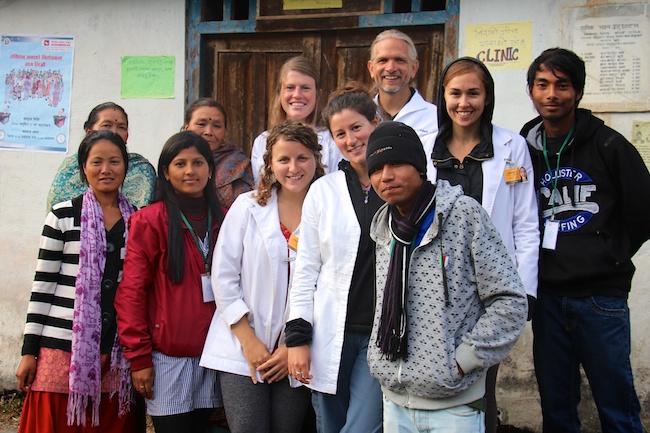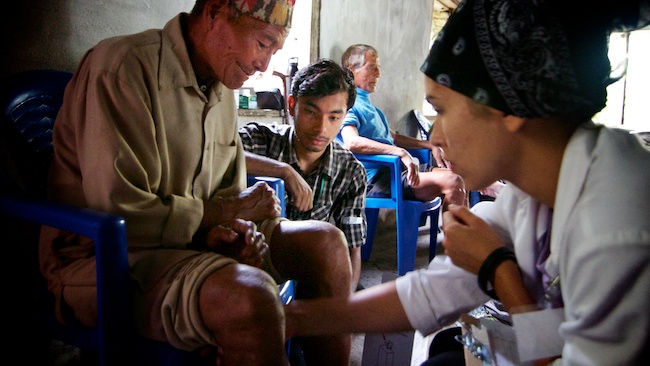
I’ll always hold space for Nepal in my heart, my soul and my hands. My hands because my hands are my tools, they are the hammers that deliver the nails (or the needles in my case) and they got a lot of action let me tell you. All of my experiences, including and probably especially the hard ones, have changed me in many ways. Some ways that I can see now and some ways that I think will continue to unravel as my life goes on. I didn't just improve my acupuncture skills, I became a primary care provider. Mostly, the experience taught me about myself.
It taught me about different ways of living or being that make it easier to understand what happiness is. I learned that I just need to relax and breathe it in. Be open and let it flow me. To cherish what I have and the people around me. It taught me a lot about cultivating true relationships and friendship.
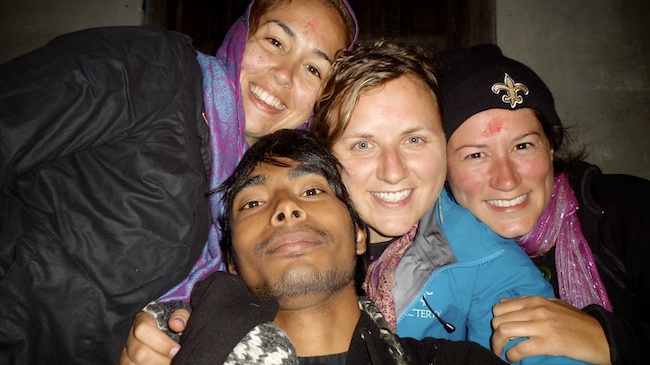
In Nepal, there is no hiding who you really are when you live with the only other five people for miles around who can speak the same language as you and you are totally cut off from the outside world. There's no getting all made up and putting in a cute outfit to look your best. There is no going home when you're tired, grumpy or uncomfortable. You show up everyday with grease in your hair and dirt on your face and you bear it all, good or bad. And you know what? People will still love and accept you for who you really are. I got closer to my clinic team than I have to many of the people who have come in and out of my life throughout the years.
Thank you Nepal for bringing these people into my life. Not only did this experience teach me about making true connections with the people I lived with; it taught me about connecting with people that don't speak the same language as I do, my patients and all the other people who live in Kogate.
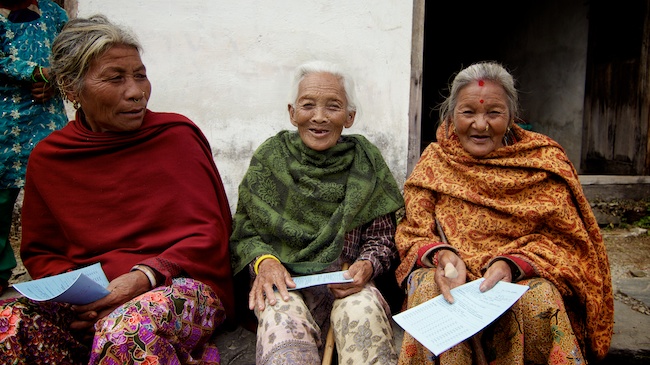
Nepal has some of the sweetest kindest people I have ever met. I felt so loved in Nepal. I was welcomed with open arms and opens hearts wherever I went. Something that I will never forget are the smiles of those people. They smile with their eyes, which offers you a glimpse into who they really are. A vulnerability, most people in the United States are unwilling or unable share. But its something that means so much and helps me to see how truly connected we all are.
We don't always need words to express compassion and love and kindness as long as we are willing and able to be open enough to connect with one another. The people of Kogate take care of one another they share and barter and feed each other. They drum and dance and sing together. They live off the land and appreciate what they have even if its not a lot and they make the best of it. Patients would come in so happy and excited that we where there to help them they would bring flowers, pumpkins, mustard greens spiny cucumbers whatever they could afford to give away. Most of all they gave us their love and kindness.
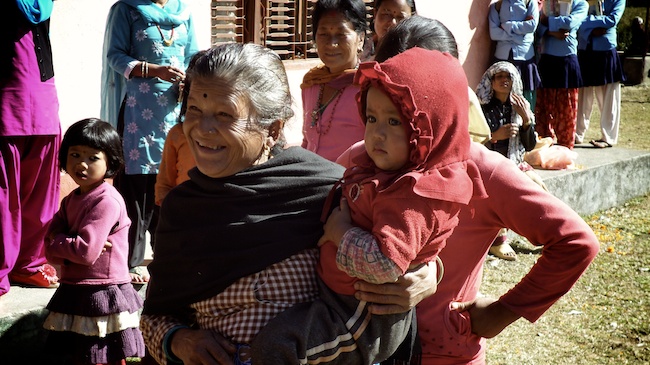
Although many of my memories of Nepal are silver lined, it wasn't always rainbows and sunshine. Literally it rained for most of the first month we were there. Some days where a real struggle for me. Living without all of the comforts of home took some getting used to I won't lie... I had to let go a lot of fear. Especially my fear of of bugs because they were everywhere including my hair. They existed in all shapes and sizes but I especially remember the giant ones. I had to sacrifice my ankles to leeches and bed bugs as a peace offering to the insect community. I had to let go of some of my control issues as nothing in Nepal seems to work right or on any sort of time schedule. Plans are just an outline for what you'd like to have happen but Nepal defies any sort of structure you may lay out.
This lesson made itself apparent even into my last days there as Nepal is having its first elections since the end of a long civil war that only ended a few years ago. There was a mass transportation strike around the country and I wasn't sure if I would make it to the airport in time to catch my flight home. And as much as I rant and rave about the people and my patients and their kindness, there’s always an exception to the rule.
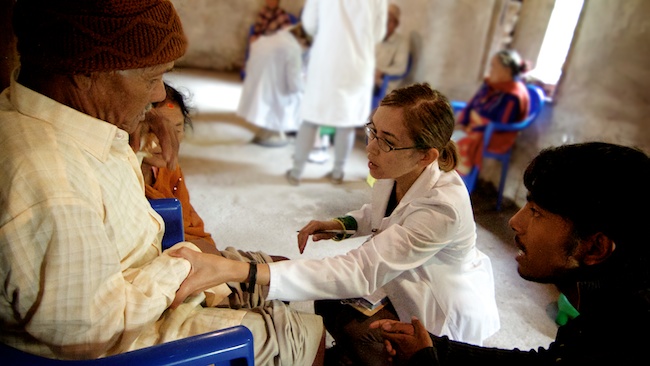
This was made apparently clear to me by one of the patients that I treated the most. He came into the clinic everyday. He was suffering from the effects of a stroke that he had last February. He lost his ability to say anything but the phase la in Nepali, which means ok. He had also lost most of the mobility of the right side of his body. He was a very angry man and rightly so. I can only image how frustrating it would be to lose so much of who you are. He got frustrated easily with my treatments because they were often painful and his anger and pain was palpable in my heart. I found it so difficult to treat him as I absorbed his frustration and I quickly became physically and emotionally drained. I found myself dreading the thought of treating him everyday. I discovered that I have a habit of looking to my patients for acceptance and I wasn't getting that from him. I began to close myself off from him, but of course this only made my treatments with him more uncomfortable.
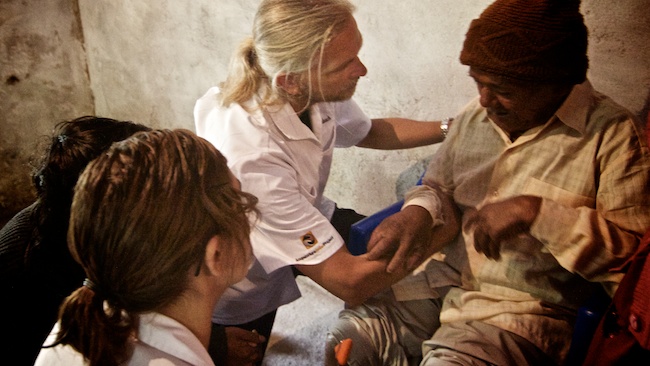
I spoke to Andrew (our project director and team lead) and he talked to me about the importance of just holding good space for people and keeping an open heart. That sometimes the largest role we can play in our patient’s lives is just showing them that we care and are there for them. This really resonated with me. Suddenly, it all made sense. All I really had to do was show him that I cared about him, that I wasn't trying to hurt him. I was really trying to help and that I was invested in him getting better. Once my attitude changed toward him, he changed his attitude about his treatment and me. He was no longer so angry. He was actually pretty happy when he came in which the whole team noticed because previous to my change in heart, he would often yell out in anger. He was also making great progress in his recovery. He regained the ability to walk on his own, he had started saying more words and he had an increase in active and passive movement of his right arm.
This was an incredibly important lesson for me to learn about patient-practitioner relationships and it was also one of the hardest and most uncomfortable experiences I had in Nepal. It just goes to show that from suffering comes growth.
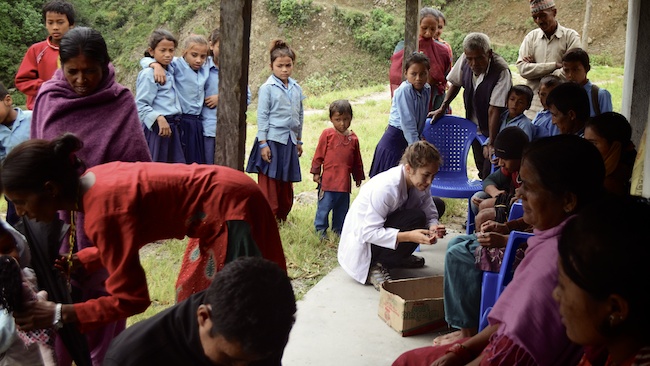
Nepal has taught me countless lessons. First and foremost, I want to remember that humanity is beautiful, don't ever give up on it. There is an incredible amount of people in the world ready and willing to freely share their kindness and love with you if you’re willing to share yours with them. Nepal has also taught me to "Harden the Fuck Up!" (a phrase we would commonly tease each other with when someone was whining a little too much). I don't need every luxury in the world to survive or to even be happy and often what I think I need is what ends up impeding my happiness. I am a lot stronger than I ever thought I was and that is truly empowering and liberating thought. As reflected on all that my Nepal experience has taught me, I can’t wait to bring these lessons home and apply them to my new life as an acupuncturist... and most of all as a human being. - Haley Merritt
